The Complete Guide to Titanium Eyeglass Frames
Updated : Nov. 24, 2025Looking for eyeglass frames so light you can barely feel them—comfortable on your nose and gentle on your skin?
Titanium eyeglass frames were made for that. They're strong, lightweight, hypoallergenic, and built to last for years.
- Advantages of titanium eyewear
- Disadvantages of titanium eyewear
- Types of titanium materials
- Styles of titanium glasses
- Components of titanium eyewear
- Surface treatments of titanium frames
- Price of titanium eyeglass frames
- Comparison with other materials
- Is titanium eyewear right for me?
- Titanium eyewear repair and maintenance
- FAQ
Advantages of titanium eyewear
If you care about lightness, comfort, hypoallergenic safety, corrosion resistance, and durability, titanium eyewear checks every box.
It's ideal for long-time wearers, people with sensitive or nickel-allergic skin, and those in outdoor or humid climates.
Lighter and more comfortable (wear all day without pressure)
Titanium has a high strength-to-weight ratio, allowing frames to be thinner and lighter.
They reduce pressure on the nose and behind the ears, stay stable during work or movement, and don't slip or pinch even when looking down at a screen.
Hypoallergenic and skin-friendly (nickel-free comfort)
Titanium is biocompatible and naturally hypoallergenic—used even in medical implants.
It's gentle on sensitive skin and safe for nickel-allergic users, minimizing irritation at contact points like the nose pads and temples.
Sweat-proof and corrosion-resistant
Titanium resists sweat, salt spray, and skin oils, preventing rust and discoloration.
Perfect for humid, coastal, or high-temperature conditions—it endures both commuting and sports.
Strong and long-lasting stability
With high tensile strength and flexibility, titanium eyeglass frames outperform most metal or plastic ones in bending and drop resistance.
Beta titanium offers even greater elasticity, with smoother springback and easier adjustment for a better fit between grip and comfort.
Aesthetic appeal and colors
Beyond its sleek metallic finish, titanium can be anodized or PVD-coated into elegant, durable shades for a refined look.
Cost-effective in the long run
Titanium frames resist fatigue and corrosion, requiring minimal maintenance and lasting for years.
If you plan to wear your glasses for two or three years, titanium eyeglass frames are often the smarter, more economical choice.
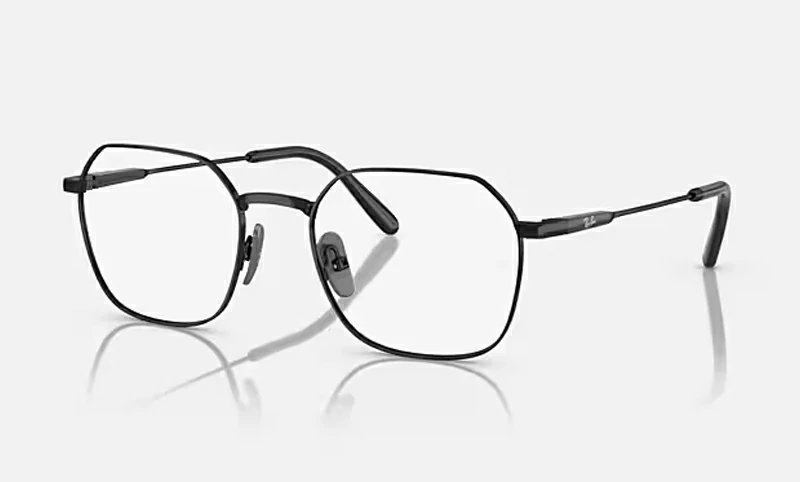
Disadvantages of titanium eyewear
While titanium eyeglass frames perform impressively in daily wear, they're not flawless.
Before buying, it's worth understanding a few potential downsides.
The main drawbacks involve price, adjustment or repair needs, surface sensitivity, and styling limits.
- Higher price: Under the same brand or category, titanium frames usually cost more than plastic or regular metal ones.
- Professional adjustment required: Fitting or repairing titanium eyewear often needs experienced technicians due to its material hardness and elasticity.
- Surface sensitivity: Titanium finishes are more prone to scratches and react poorly to harsh cleaning. Improper cleaning or friction with hard objects can damage the coating.
- Limited styling flexibility: Unlike acetate or plastic, titanium offers less freedom in shapes and colors—most designs favor minimalist or fine-line aesthetics.
Types of titanium materials and their differences
For most wearers, pure titanium and beta titanium meet over 90% of daily needs.
Memory metal (Ni-Ti alloy) is more of a special option for shape recovery, but not ideal for nickel-sensitive users.
Pure titanium (Gr.1–Gr.4)
Contains about 99% titanium with minimal impurities.
It's hypoallergenic, corrosion-resistant, lightweight, and has a premium matte metallic look that can be anodized in various colors.
- Extremely skin-friendly and safe for sensitive or nickel-allergic users.
- Strong yet ultra-light, perfect for long-time wear.
- Resists oxidation and maintains its metallic luster for years.
Best suited for business, commuting, and minimalist styles — ideal for users with sensitive skin, heavy perspiration, or living in coastal/humid climates.
Beta titanium (beta titanium alloy)
Alloyed with small amounts of vanadium and aluminum to enhance elasticity and strength.
It combines flexibility with lightness, making it durable and comfortable.
- Excellent flexibility allows gentle adjustment for a better fit.
- Higher strength — great for sports or active lifestyles.
- Still hypoallergenic with outstanding corrosion resistance.
Perfect for wearers who prioritize comfort and movement.
Memory metal (nickel titanium / Ni-Ti alloy)
A shape-memory alloy that returns to its original form after bending.
- Highly flexible and resistant to breakage.
- Great for children or users prone to bending their glasses.
- Contains nickel — not recommended for nickel-allergic wearers.
Commonly used in children's eyewear, sports glasses, or high-stress applications.
Material identification:
You can usually find the material marking on the inner temple or the back of the bridge — labeled as Pure Titanium, All Titanium, β-Titanium, or Ni-Ti.
When a frame is marked only Titanium, it may mean that only part of it (like the temples) is made of titanium, while All Titanium or Pure Titanium indicates a fully titanium construction.
Styles of titanium glasses
Titanium eyewear isn't just lightweight and durable — it also comes in diverse styles. Whether you prefer minimalist, vintage, or modern looks, there's always a titanium frame that fits your face and personality.
Classic Rectangle Frames
Balanced and versatile, this is the most common titanium eyewear style. The rectangular shape flatters most face types and works well for both office and formal settings.
Contact us now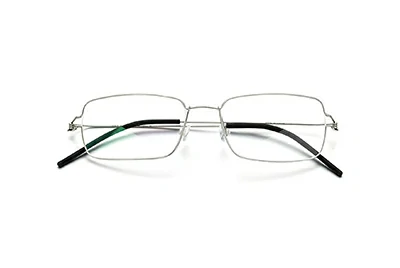
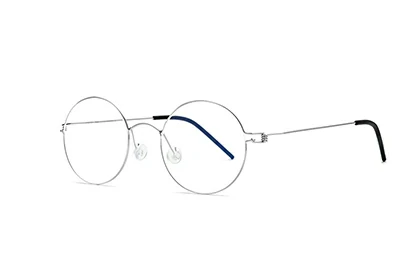
Round Titanium Frames
A vintage and artistic favorite, round frames are back in fashion thanks to movies and retro trends. Titanium’s light weight and slim design make these glasses more comfortable and durable.
Contact us nowAviator Titanium Frames
Inspired by classic pilot sunglasses, the teardrop shape gives off confidence and character. The titanium build keeps them strong yet light, reducing nose pressure and preventing deformation.
Contact us now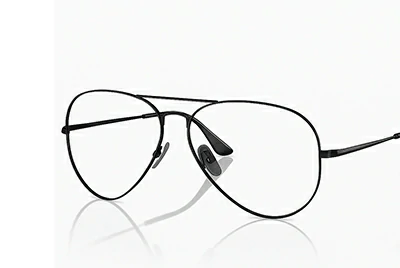
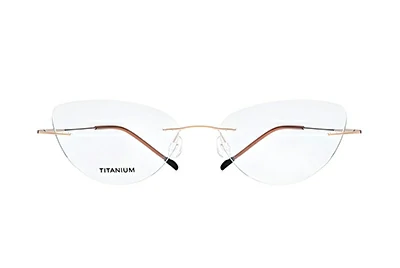
Cat-Eye Titanium Frames
Elegant and feminine, the upward-curved design highlights your eyes beautifully. Titanium makes cat-eye glasses lighter and less likely to slip.
Contact us nowBrowline Titanium Glasses
With a bold upper rim and thin lower rim mimicking eyebrows, this style blends vintage charm with modern flair. It adds character and dimension to your look.
Contact us now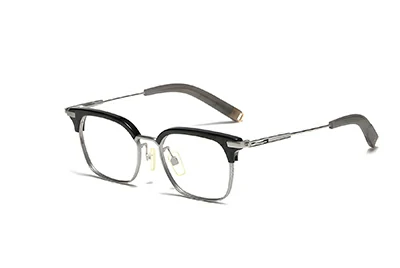
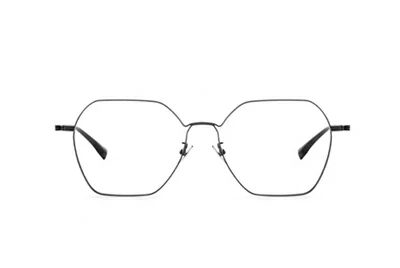
Oversized Titanium Glasses
Bold and expressive, these frames are loved by fashion-forward wearers. Despite their size, titanium keeps them lightweight and comfortable, giving a face-slimming visual effect.
Contact us nowRimless Titanium Glasses
The symbol of minimalism — almost invisible frames that keep your face clean and sharp. Supported by titanium bridges and temples, they feel nearly weightless.
Contact us now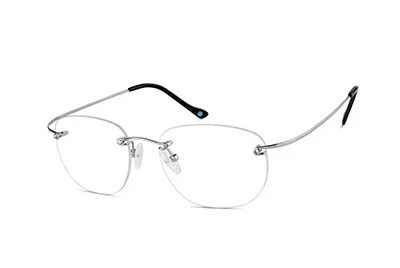
Note: We do not sell titanium eyeglass frames — we are a supplier of titanium materials for eyewear manufacturers.
Components and key parts of titanium eyewear
Titanium eyeglass frames are typically made of wires, profiles, temple modules, hinges, nose pad arms, bridges, thin-wall tubes, and screws.
Each detail affects comfort and durability:
- Wires / profiles: Determine the frame's strength and lightness.
- Temple modules: Affect balance and clamping comfort.
- Hinges and screws: Control the smoothness and longevity of opening and closing.
- Nose pad arms and bridge: Influence fit and weight distribution.
- Thin-wall tubes / sleeves: Common in rimless or semi-rimless designs, combining lightness and stability.
Want to know what titanium materials lie behind these parts?
We are a professionalsupplier of titanium and titanium alloys , providing eyewear manufacturers with high-precision titanium wires, profiles, nose pad arms, bridges, screws, and tubes.
Surface and color of titanium eyewear
Titanium eyeglass frames are not only light but also stylish — much of their beauty comes from anodizing (Anodized Titanium) and PVD (Physical Vapor Deposition).
These processes define the frame's color, gloss, sweat resistance, and scratch durability.
Anodized titanium
Anodizing uses an electrochemical process to create an oxide layer on the titanium surface.
This layer itself produces color — not paint or plating.
- Lightweight and eco-friendly: No added coating, no peeling.
- Natural, soft colors: Offers subtle tones like silver gray, gold, blue, or violet.
- Corrosion-resistant: The oxide layer stays stable against sweat, rain, and sea air.
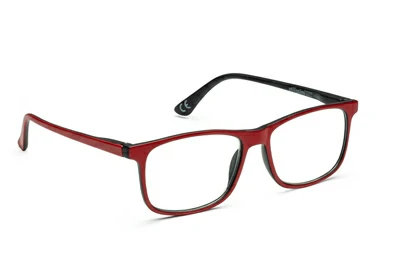
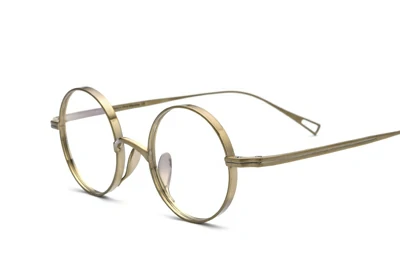
PVD coating (Physical Vapor Deposition)
PVD is a high-vacuum coating method that deposits metal or ceramic particles onto titanium, forming a dense protective layer.
- Vibrant, rich colors: Enables black gold, rose gold, champagne, or gunmetal finishes.
- Scratch and wear resistant: More durable than traditional electroplating.
- Premium texture: Delivers a refined metallic sheen, favored by luxury eyewear brands.
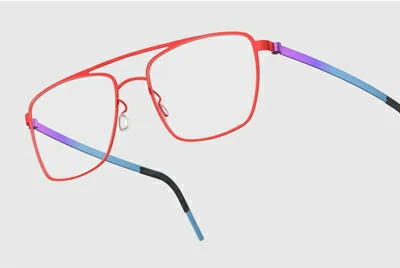
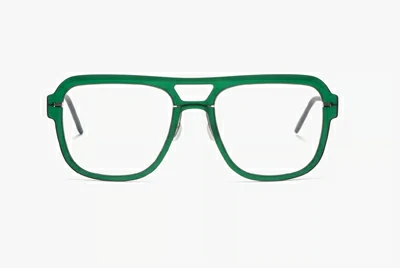
Anodized titanium feels more natural and skin-friendly, while PVD titanium offers a more fashionable, high-gloss look.
Choose anodized for lightweight, fade-free color; choose PVD for luxurious shine and durability.
With trusted brands and proper care, titanium eyewear will stay beautiful and last for years.
Price of titanium eyewear
Estimated prices in the U.S. market:
| Entry-level | Popular fashion brands | Designer / premium | High-end / handmade |
|---|---|---|---|
| $35–$90 | $150–$250 | $400–$700 | $700–$1,000 |
Why are titanium frames more expensive?
- Titanium is strong but difficult to process. Making it thin and light while maintaining strength requires precise cutting, stamping, welding, and polishing.
- Anodized and PVD finishes must balance color stability, sweat resistance, scratch resistance, and batch consistency.
- Smooth hinges, adjustable nose pad arms, fine polishing, and dimensional accuracy all demand skill and time.
- Brand and design also add value — classic shapes, lightweight structures, and Japanese materials or craftsmanship contribute to the premium.
The value of a good titanium eyeglass frame lies in what you can feel: visible craftsmanship, stable comfort, and long-lasting quality.
If you plan to wear your glasses for two or three years, titanium frames are often the more economical, stylish, and reliable choice.
Comparison: titanium vs plastic and metal eyeglass frames
| Category | Titanium frames | Plastic frames | Metal frames |
|---|---|---|---|
| Durability | Extremely durable, resistant to bending and breaking | Durable but more prone to cracking or warping | Generally durable, though some types bend easily |
| Weight & comfort | Lightweight and comfortable for long wear | Can be light, but some designs feel heavier | Varies by type; often heavier than titanium |
| Skin-friendliness | Hypoallergenic and biocompatible, minimal irritation risk | Some materials may cause skin irritation or allergies | Certain metals (like nickel) can cause skin irritation |
| Aesthetics & style | Sleek, modern look with natural metallic sheen | Wide variety of colors and styles for different tastes | Style and design vary depending on the metal type |
| Corrosion resistance | Highly corrosion-resistant | Not prone to corrosion | Common metals may rust or react to sweat |
| Adjustability | Highly elastic, easy to adjust, and structurally stable | Limited flexibility; excessive bending may cause cracks | Adjustable, but may loosen over time |
| Maintenance & lifespan | Replaceable nose pads/screws, stays firm over years | Hard to repair when cracked, shorter lifespan | Repairable but surface wears easily |
| Overall cost (2–3 years) | Higher upfront cost but more durable and economical long term | Low price but frequent replacements needed | Mid-range cost, depends on material quality |
Is titanium eyewear right for me?
Almost everyone can wear titanium eyeglass frames, but some people will notice even greater benefits — lighter weight, better comfort, sweat and corrosion resistance, and hypoallergenic performance.
For sensitive skin or nickel allergy
Titanium is hypoallergenic and skin-friendly, reducing redness and irritation at contact points.
If you're allergic to nickel, avoid memory metal (Ni-Ti) and choose pure titanium or beta titanium instead.
For people who wear glasses 6+ hours a day
With a high strength-to-weight ratio, titanium frames are thinner and lighter, easing pressure on the nose and behind the ears.
Those who work, study, drive, or use screens for long hours will feel the "weightless comfort” difference.
For coastal, humid, or sweaty environments
Titanium resists corrosion from sweat and salt, preventing rust and discoloration.
Perfect for seaside residents, outdoor workers, gym-goers, and daily commuters.
For active users and students
Beta titanium temples offer great flexibility and rebound, staying snug and stable.
They endure frequent on-and-off use, minor drops, or active movements without loosening.
For high prescriptions or aesthetic balance seekers
Titanium's light frame pairs well with thin lenses, creating better balance and preventing slippage.
Ideal for rimless, semi-rimless, or minimal thin-edge designs that keep your look clean and refined.
If you have sensitive skin, sweat easily, live near the sea, or wear glasses over six hours a day, titanium eyewear is simply the smarter, more comfortable, and more durable choice.
Repair and maintenance of titanium eyewear
Titanium eyeglass frames are strong—but not unbreakable.
The good news: most issues can be fixed easily, as long as you handle them correctly and don't try to bend them yourself.
Frame bending or deformation
Common causes: sitting on them, pressure in a bag, or accidental impact.
Do not try to bend them back by hand. A professional optician can restore the original shape using heat and specialized tools, keeping balance and weight distribution intact.
Before repair, store the glasses flat to avoid further stress.
Loose screws or hinges
Typical signs: wobbly temples, uneven opening, or shaking lenses.
Visit an optical shop to replace screws and apply a thread-locking agent. If the screw holes are worn, micro-sleeves can be added for reinforcement.
If the hinges are loose, they may need re-riveting or replacement parts.
Never use super glue—it can damage the frame permanently.
Scratched lenses
For light scratches, use lens repair fluid or a soft polishing cloth.
For deep ones, replace the lenses—the titanium frame can still be reused.
When wearing or storing, keep lenses away from keys or hard objects; wipe off sweat to prevent salt residue from scratching the surface.
Broken or detached temples
Signs include one side breaking, hinge loosening, or difficulty opening.
Titanium temples can often be laser-welded, restoring strength close to the original.
If the break is near the rim or hinge, replacing the entire temple is safer.
Ask whether the brand or supplier provides original or compatible replacement parts to ensure a perfect color and fit.
Surface corrosion or discoloration
Clean gently with a mild neutral cleaner.
If the anodized or PVD coating has aged, professionals can reapply the finish.
After daily wear, wipe the frame dry; in coastal or humid climates, anodized titanium offers better corrosion resistance.
Key maintenance tips
- Check nose pads, screws, and hinges regularly to prevent minor issues from worsening.
- Have your glasses adjusted every six months—many brands offer free service.
- Avoid direct sunlight, high heat, or rough bending; store your glasses in a hard case when not in use.
Frequently asked questions (FAQ)
What are the disadvantages of titanium eyewear?
Titanium frames have few real drawbacks. The main ones are higher price, the need for professional tools during repair or adjustment, and surface coatings that can be sensitive to scratches. With proper care, however, they can last for years without deforming or fading.
Are titanium eyeglass frames worth buying?
Absolutely. Titanium eyewear is lightweight, strong, hypoallergenic, and corrosion-resistant. Over time, they're more comfortable and worry-free to wear. Though the initial cost is higher, the total cost of ownership (TCO) over two to three years is often lower.
What are the advantages of titanium eyewear?
Key benefits include light weight, high strength, corrosion resistance, hypoallergenic comfort, and a modern look. Beta titanium adds superior flexibility and shape retention — ideal for long-term wearers or people with sensitive skin.
How long do titanium eyeglass frames last?
Typically 3–5 years with stable use; with regular cleaning and adjustment, they can keep their form and color for up to 7 years.
How to know if you need glasses?
If you often feel eye strain, have blurry vision, squint frequently to focus at different distances, or struggle with night driving, it's time for an eye exam at a professional optometry clinic.
Where can you buy titanium eyewear?
Warby Parker — Stylish mid-range titanium frames with virtual try-on. Zenni Optical — Entry-level pricing, wide style selection, great value. EyeBuyDirect — Affordable options with frequent discounts. Other brands like Ray-Ban, Oakley, Silhouette, LINDBERG, and ic! berlin also offer titanium collections.
Want to learn more about the materials used in titanium eyewear?
Check the titanium eyewear material specifications and available stock — contact us today!




